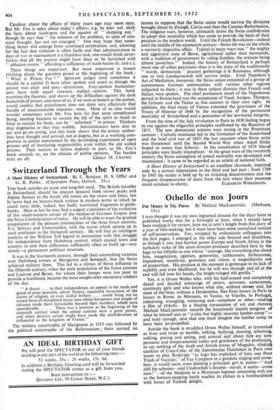Switzerland Through the Years
A Short History of Switzerland. By E. Bonjour, H. S. Offer and G. R. Potter. (Clarendon Press, Oxford. 35s.) Tins book satisfies an acute and long-felt need. The British traveller in Switzerland, should his interest descend from snowy peak and Alpine flowers to the lovely old towns on the rivers and lakes, has hi herto had no history-book written in modern terms to which he could turn; little, indeed, but badly translated fragments in guide- books. Here at last he may find a cogent expOsition of the evolution of this south-western corner of the mediaeval German Empire into the Swiss Confederation of today. He will be able to trace the gradual coagulation of the peasant communities of the three forest cantons, Uri, Schwyz and Unterwalden, with the towns which sprang up in such profusion in the thirteenth century. He will find an intelligent analysis of the William Tell legend in connection with that struggle for independence from Habsburg control, which caused town and country to sink their differences sufficiently often to build up—very slowly—a permanent political structure.
It was in the fourteenth century, through their astonishing victories over Habsburg armies at Morgarten and Sempach, that the Swiss achieved military fame. This led to a climax of Swiss influence in the fifteenth century, when the male population of the forest cantons and Lucerne and Berne, for whom their homes were too poor to provide a livelihood, became the most sought-after mercenary soldiers of the day.
" A threat . . . to their independence, an appeal to the needs and greed of poor peasants, adroit flattery, successful invocation of the claims of religion, or even skilful bribery . . . could bring out un armed force of disciplined brave men whose fire-power and weight of advance made them formidable beyond their numbers, which were. considerable. . . . There was a moment at the beginning of the sixteenth century when the united cantons were a great power, and when decisive action might have made the confederation as influential as the kingdom of France."
The military catastrophe of Marignano in 1515 was followed by the political catastrophe of the Reformation ; there seemed no reason to suppose that the Swiss union would survive the divisions brought about by Zwingli, Calvin and then the Counter-Reformation. The religious wars, however, ultimately drove the Swiss confederates to adopt that neutrality which has come to provide the basis of their position in the modem world. Until the French Revolution—indeed until the middle of the nineteenth century—Swiss life was on the whole a narrowly oligarchic affair. Typicalin many ways was " the mighty and aggressive state of Berne, agricultural rather than mercantile, with a tradition of government by ruling families, the artisans being almost powerless." Indeed, the history of Switzerland is perhaps more one of urban patriciates than it is the story of the traditionally " sturdy, democratic " peasant gatherings a la Rousseau, although one or two Landsgemeinde still survive today. Until Napoleon's Act of Mediation, moreover, the Swiss union consisted of a group of autonomous German communities with various other regions subjected to them ; it was in these subject districts that French and Italian were spoken. The chief permanent result of the Napoleonic period in Switzerland was the acceptance of Vaud, Aargau, Thurgau, the Grisons and the Ticino as free cantons in their own right. In addition, the final treaty of Vienna extended the provisions of the Treaty of Munster of 1648 by the recognition of the permanent neutrality of Switzerland and a guarantee of her territorial integrity.
From the time of the July revolution in Paris in 1830 feeling began to rise against the oligarchic principles reaffirmed by the Reaction of 1815. The new democratic notions were strong in the Protestant cantons ; Catholic resistance led to the formation of the Sonderbund and the brief civil war of 1847, the last occasion when Swiss unity was threatened until the Second World War when Adolf Hitler hoped to annex Gau Schweiz: In the constitution of 1874 liberal principles were finally triumphant. In the great wars of the twentieth century the Swiss conception of armed neutrality was developed and maintained ; it came to be regarded as an article of national faith.
A Short History of Switzerland is an excellent chronicle, impaired only by a certain imprecision in the third and last part ; from 1789 to 1945 the reader is held up by an irritating discursiveness and the frequent disappearance of dates from the text where their presence


































 Previous page
Previous page